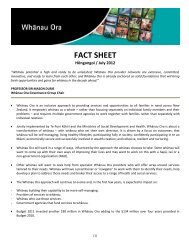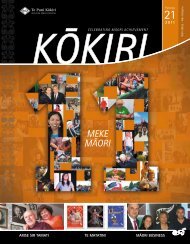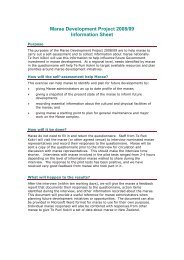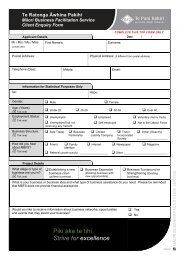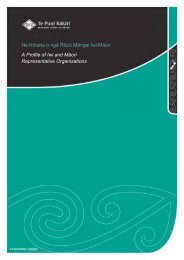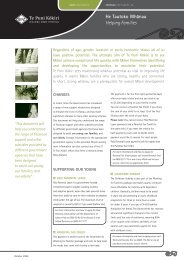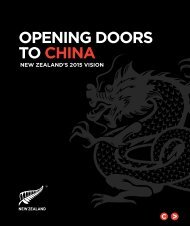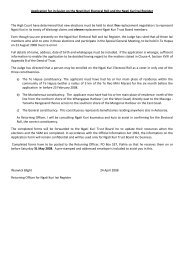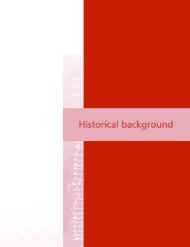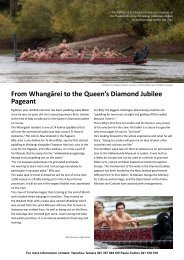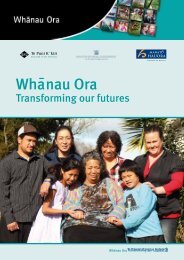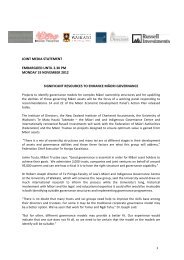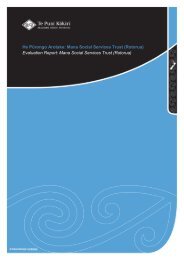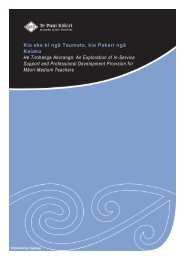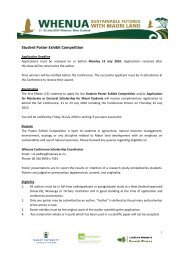Whanau Ora : Report of the Taskforce on Whanau-Centred Initiatives
Whanau Ora : Report of the Taskforce on Whanau-Centred Initiatives
Whanau Ora : Report of the Taskforce on Whanau-Centred Initiatives
Create successful ePaper yourself
Turn your PDF publications into a flip-book with our unique Google optimized e-Paper software.
7.2.3 A challenge for whānau-centred initiatives will be determining <str<strong>on</strong>g>the</str<strong>on</strong>g> nature,<br />
range and significance <str<strong>on</strong>g>of</str<strong>on</strong>g> Māori networks. Networks may be enjoyed for<br />
cultural reas<strong>on</strong>s, such as kapa haka and sporting events, or may extend to<br />
marae and iwi activities. All whānau members have iwi affiliati<strong>on</strong>s, although<br />
<str<strong>on</strong>g>the</str<strong>on</strong>g>y may not exercise <str<strong>on</strong>g>the</str<strong>on</strong>g>m in a manner that could bring benefits to <str<strong>on</strong>g>the</str<strong>on</strong>g><br />
whānau. In that respect, whānau who are not able to access and participate<br />
in te ao Māori are at a disadvantage. The <str<strong>on</strong>g>Taskforce</str<strong>on</strong>g> c<strong>on</strong>siders that whānau<br />
participati<strong>on</strong> in te ao Māori has <str<strong>on</strong>g>the</str<strong>on</strong>g> potential to improve whānau social,<br />
cultural and ec<strong>on</strong>omic wellbeing and at <str<strong>on</strong>g>the</str<strong>on</strong>g> same time c<strong>on</strong>tribute to<br />
wider society.<br />
To embrace our people we<br />
need to talk about <str<strong>on</strong>g>the</str<strong>on</strong>g> values<br />
that are important to <str<strong>on</strong>g>the</str<strong>on</strong>g>m.<br />
For us Whānau <str<strong>on</strong>g>Ora</str<strong>on</strong>g> is<br />
anything we want it to be,<br />
anything we can dream<br />
it to be, so whānau are<br />
empowered to be <str<strong>on</strong>g>the</str<strong>on</strong>g> best<br />
<str<strong>on</strong>g>the</str<strong>on</strong>g>y can be.<br />
7.2.4 A Māori world view also has implicati<strong>on</strong>s for practice methodologies.<br />
While <str<strong>on</strong>g>the</str<strong>on</strong>g>re are many variati<strong>on</strong>s, three comm<strong>on</strong> aims underpin<br />
whānau-centred practices.<br />
• The centre <str<strong>on</strong>g>of</str<strong>on</strong>g> attenti<strong>on</strong> is <str<strong>on</strong>g>the</str<strong>on</strong>g> whānau as a group. Individual wellbeing is<br />
not dismissed, nor neglected, but <str<strong>on</strong>g>the</str<strong>on</strong>g> primary focus is <strong>on</strong> <str<strong>on</strong>g>the</str<strong>on</strong>g> functi<strong>on</strong>s,<br />
aspirati<strong>on</strong>s and sustainability <str<strong>on</strong>g>of</str<strong>on</strong>g> <str<strong>on</strong>g>the</str<strong>on</strong>g> collective.<br />
• The major goals <str<strong>on</strong>g>of</str<strong>on</strong>g> a whānau-centred approach are <str<strong>on</strong>g>the</str<strong>on</strong>g> development<br />
<str<strong>on</strong>g>of</str<strong>on</strong>g> whānau resilience, whānau capacities and whānau capability, ra<str<strong>on</strong>g>the</str<strong>on</strong>g>r<br />
than <str<strong>on</strong>g>the</str<strong>on</strong>g> investigati<strong>on</strong> <str<strong>on</strong>g>of</str<strong>on</strong>g> whānau dysfuncti<strong>on</strong> or <str<strong>on</strong>g>the</str<strong>on</strong>g> management <str<strong>on</strong>g>of</str<strong>on</strong>g><br />
whānau inadequacies. Although a whānau crisis (whe<str<strong>on</strong>g>the</str<strong>on</strong>g>r centred around<br />
an individual or group) can be a source <str<strong>on</strong>g>of</str<strong>on</strong>g> serious c<strong>on</strong>cern, it also brings<br />
potential for whānau growth and through this engagement, identify <str<strong>on</strong>g>the</str<strong>on</strong>g><br />
requirements for whānau to become self-managing. The challenge for<br />
whānau and practiti<strong>on</strong>ers is to c<strong>on</strong>vert <str<strong>on</strong>g>the</str<strong>on</strong>g> crisis into an opportunity for<br />
growth and <str<strong>on</strong>g>the</str<strong>on</strong>g>n to help whānau become self-managing.<br />
• Whānau-centred methodologies are inextricably linked to relati<strong>on</strong>ship<br />
management; relati<strong>on</strong>ships between generati<strong>on</strong>s, between genders,<br />
between whānau and community instituti<strong>on</strong>s, between different agencies<br />
(public, private, NGOs and Māori providers) and between whānau, hapū<br />
and iwi.<br />
7.2.5 Practiti<strong>on</strong>ers come from a wide range <str<strong>on</strong>g>of</str<strong>on</strong>g> disciplines and agencies but to<br />
be effective need to have <str<strong>on</strong>g>the</str<strong>on</strong>g> knowledge, skills and training to foster <str<strong>on</strong>g>the</str<strong>on</strong>g><br />
development <str<strong>on</strong>g>of</str<strong>on</strong>g> a kawa (protocol) that will guide whānau into <str<strong>on</strong>g>the</str<strong>on</strong>g> future.<br />
Many practiti<strong>on</strong>ers have instinctive understandings <str<strong>on</strong>g>of</str<strong>on</strong>g> whānau needs and<br />
know intuitively how to resp<strong>on</strong>d. However, <str<strong>on</strong>g>the</str<strong>on</strong>g> <str<strong>on</strong>g>Taskforce</str<strong>on</strong>g> recognises <str<strong>on</strong>g>the</str<strong>on</strong>g><br />
importance <str<strong>on</strong>g>of</str<strong>on</strong>g> practice standards that not <strong>on</strong>ly take c<strong>on</strong>sistency <str<strong>on</strong>g>of</str<strong>on</strong>g> practice<br />
into account but are also premised <strong>on</strong> te ao Māori.<br />
7.2.6 The <str<strong>on</strong>g>Taskforce</str<strong>on</strong>g> notes <str<strong>on</strong>g>the</str<strong>on</strong>g> distinctiveness <str<strong>on</strong>g>of</str<strong>on</strong>g> whānau-centred practice and<br />
commends <str<strong>on</strong>g>the</str<strong>on</strong>g> approach as an appropriate vehicle for <str<strong>on</strong>g>the</str<strong>on</strong>g> promoti<strong>on</strong> <str<strong>on</strong>g>of</str<strong>on</strong>g><br />
whānau wellbeing.<br />
56



